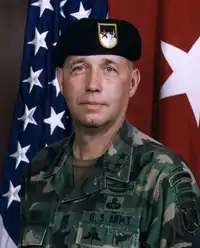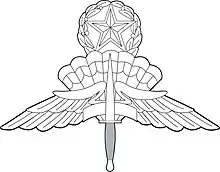Kenneth Bowra
Kenneth Rhodes Bowra (born October 23, 1948) is a retired major general who served in the US Army from 1970 to 2003. Bowra saw service with US special forces in the Vietnam War and Cambodian Civil War and has worked with the Central Intelligence Agency and Joint Special Operations Command. He later fought in the US Invasion of Grenada and in the Somali Civil War and First Gulf War. In 1998 he was given command of the John F. Kennedy Special Warfare Center and School and in 2000 was deputy commander of NATO's Kosovo Force. Retiring in 2003 he is now a diplomat with the US State Department in Saudi Arabia.
Major-General Kenneth Bowra | |
|---|---|
 US Army portrait | |
| Born | October 23, 1948 |
| Allegiance | United States of America |
| Service/ | |
| Years of service | 1970–2003 |
| Rank | |
| Unit | 82nd Airborne Division 4th Infantry Division 75th Ranger Regiment MACV-SOG Delta Force |
| Commands held | 5th Special Forces Group 1st Special Forces Command United States Southern Command John F. Kennedy Special Warfare Center and School |
| Wars |
|
Vietnam
Kenneth Bowra attended The Citadel military college in South Carolina and graduated in 1970. He was commissioned into the 82nd Airborne Division and completed special forces training. Deployed in the Vietnam War initially as a Military Assistance Command, Vietnam – Studies and Observations Group reconnaissance team leader Bowra later served as an advisor to Cambodian Army units undertaking training with US forces, leading them on combat missions in Cambodia. Upon his return to the US he served as commander of a High Altitude Low Opening Special Atomic Demolition Munition paratroop unit with the 5th Special Forces Group. Bowra was posted back to Cambodia in 1974 with the Military Equipment Delivery Team Cambodia and remained in the country until the April 1975 collapse of the Khmer Republic.[1]
Special operations
Bowra spent the next eight years on various assignments with the Central Intelligence Agency from 1977-1978, 4th Infantry Division in Fort Carson, Colorado and the 2nd battalion of the 75th Ranger Infantry Regiment (Airborne) at Fort Lewis in Washington. In 1983 Bowra volunteered for and completed a specialized selection course for assignment to Delta Force and remained with the unit for five years, participating in Operation Urgent Fury in Grenada.[1] Bowra returned to the 5th Special Forces Group in 1988 as the commander of the 2nd battalion and worked on Operation Salam, a de-mining operation in Afghanistan. He was promoted to commander of Army 5th Special Forces Group from 1991 to 1993 and conducted combat and humanitarian operations in Somalia as well as border surveillance and combat operations in Kuwait. He was placed in charge of Special Operations Command South, United States Southern Command in November 1993, and held that post until January 1996. Whilst with that unit Bowra led anti-drugs and humanitarian operations in Central and South America and formed the multi-national peace-keeping force that helped to end the Cenepa War.[1]
Bowra was assigned command of the U.S. Army Special Forces Command (Airborne) in May 1996 where he helped to develop the first human rights policy for US special forces soldiers.[1] Bowra was given command of the John F. Kennedy Special Warfare Center and School in March 1998 and in March 2000 was deputy-commander of the NATO headquarters of Kosovo Force (KFOR) with responsibility for overseeing all KFOR operations (including Russian forces) and providing support for elections in the country. He was appointed assistant chief of staff of NATO's Allied Forces Northern Europe in January 2001 and was simultaneously the senior American military representative to the Netherlands. Bowra retired from the army as a major-general on 1 October 2003. He now works for the State Department as a diplomat at the US embassy in Saudi Arabia.[1] Bowra has written about the Vietnam and Cambodian wars.[2]
The most recent U.S. State Department listing of key officials in foreign posts does not show Bowra in any post in Saudi Arabia.[3]
Awards and decorations
| Combat Infantryman Badge | |
| Expert Infantryman Badge | |
| Special Forces Tab | |
| Ranger Tab | |
.svg.png.webp) |
Master Parachutist Badge with SWCS background trimming |
 |
Military Free Fall Jumpmaster Badge |
 |
Pathfinder Badge |
| Irish Parachutist Badge in silver | |
| Unidentified foreign parachutist badge | |
 |
John F. Kennedy Special Warfare Center and School Combat Service Identification Badge |
| ? Overseas Service Bars |
References
- "Distinguished Member of the Special Forces Regiment" (PDF). United States Army Special Operations Command. Retrieved 31 March 2013.
- "Kenneth Bowra authored books". Google Books. Retrieved 31 March 2013.
- United States Department of State dated 11 March 2013; see pages KO-55 and KO-56